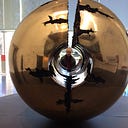About “Life’s Narrow Beam” & other poems
Usually it’s not a good idea to interpret your own poems, but I want to talk about this one to let you in on something, if you haven’t guessed it. While I could convey a poem’s message in an essay, the poetic format allows me to consider the wrappers used for the message. Poems are not simply “statements.” Where do words come from? Why do you choose one word rather than another? What neighborhoods do words share? What is emphasized by form, placement, rhymes and other echo-effects, enjambments (run-on lines), capitalization, tone, pace, melody, and punctuation? Any surprises?
Well, in this poem, the “beam” seems to be about light. Poems by Paul Verlaine and Wm. Cowper echo this possibility — as does “Row, row, your boat.” This possibility is strengthened by the meaning of “the devil beats his wife,” a colloquial expression referring to seeing sunlight during a shower, sometimes called a “sunshower.”
But you’re warned not to believe this — no matter what the ‘lines’ of poetry suggest. Indeed, the way things seem could be a feint like the visual illusions created by film-makers using blue rooms to make ghosts appear, the subject of “A Ghost of a Chance,” a poem from a few days ago.
You may even discover that you are not where you thought you were. In this case, not a “beam” of light at all, but the narrow beam of a small sail boat keeling in a storm, its sail still wrapped. Since it is of narrow width (narrow beam), it is unstable — not unlike life, where stability is a matter of dynamic corrections from moment to moment, not a state of being permanently achieved by having the right ideas or practices.
This switch-around which you discover by “turning quickly around” to see your “line is paid out” is a frame-shift, an effect I often seek in poems and in other writings. (See below.) Frame-shifting is also a life-practice which I recommend, but that’s another story.
The “line paid out” tingles for a moment as you realize that the phrase refers simultaneously to the rope-line attached to the sinking sail, the possible end of the sailor’s life-line as the boat keels over, and the final line of the poem. So why do I mention all this and not just let you discover it for yourself?
Two reasons: (1) I’m quite serious about these poems, even when the tone is humorous. Getting others to take them seriously as poems rather than as “statements” suitable for the line of this or that publication is vexing. Indeed, the reason I’m publishing this book a poem at a time on Medium is to avoid the folks who think I must make a statement that agrees with the current line of their publication. (2) The other reason to talk about the poems for a moment is that the book is soon coming to its half-way point, when it will ask you to “turn quickly around” and make another frame-shift.
In “Things Need Not Be This Way,” you will suddenly be in the territory of an extended narrative poem with long stanzas. As such, it will make different demands on readers than the “one minute reads” previously published. Let me know how you become engaged in it — if you do. — rr
More frame-shifts, poetic and narrative, are to be found here:
FRAMESHIFTS vol. 1: https://www.amazon.com/dp/B005IQMDDI/ref=dp-kindle-redirect?_encoding=UTF8&btkr=1
FRAMESHIFTS vol. 2: https://www.amazon.com/s?k=frameshifts+rose+VOLUME+2&ref=nb_sb_noss
COMING AROUND: https://www.amazon.com/Coming-Around-Richard-Rose/dp/1947860089
